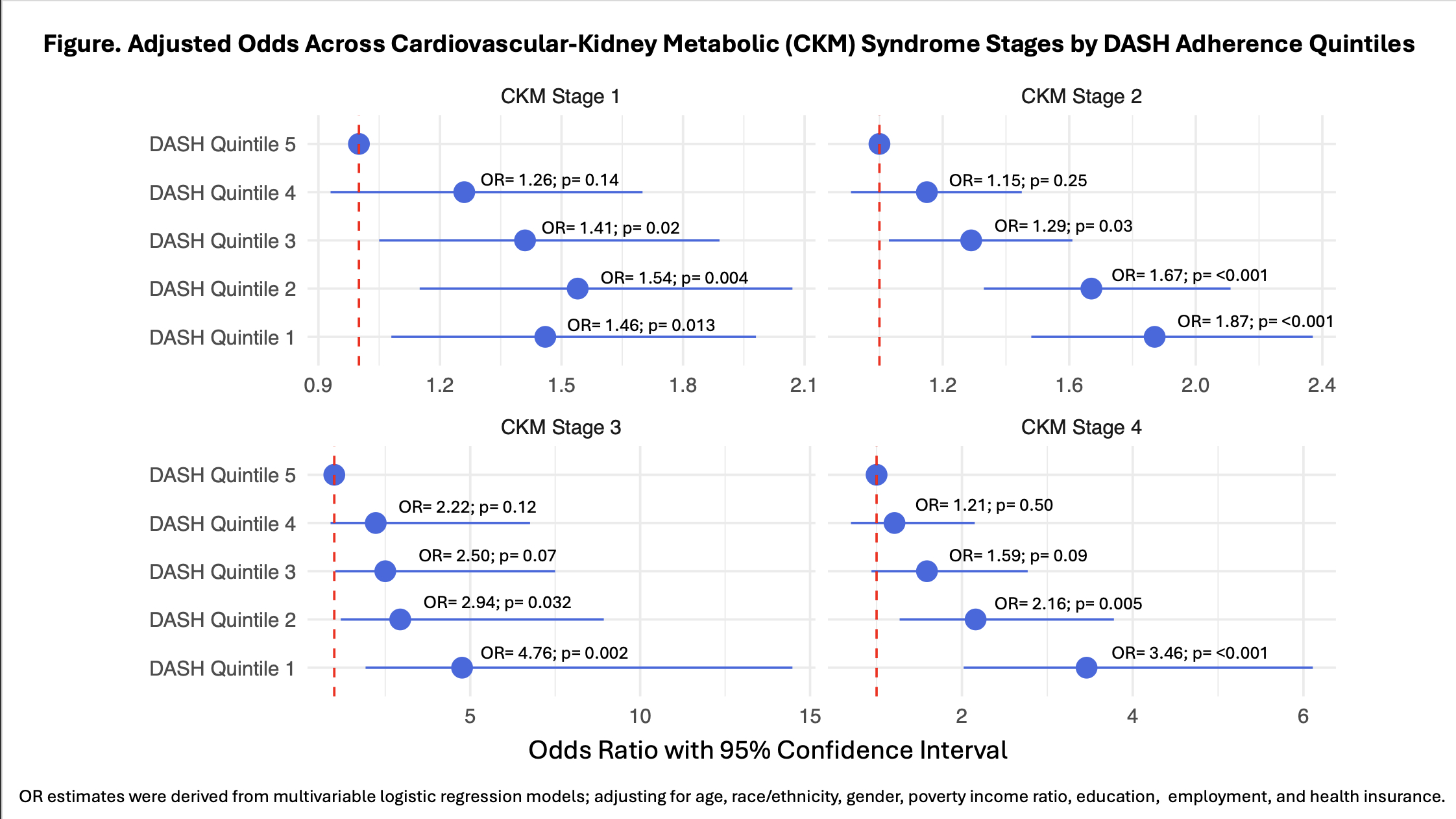Final ID: P1024
Associations between DASH Diet Adherence and Cardiovascular-Kidney Metabolic (CKM) Syndrome Stages: 2011-2020 National Health and Nutrition Examination Survey
Abstract Body: Background: Cardiovascular-kidney metabolic (CKM) syndrome substantially contributes to rising healthcare costs and reduced life expectancy, particularly in underserved communities. The relationship between dietary approaches such as Dietary Approaches to Stop Hypertension (DASH) in managing CKM syndrome is unclear.
Objective: To assess the relationship between DASH adherence and CKM syndrome stages among US adults.
Methods: Cross-sectional data from the 2011-2020 National Health and Nutrition Examination Survey (NHANES) were analyzed. DASH scores (range: 17-37) were divided into quintiles: Q1 (<24.5, lowest), Q2 (>24.5-27), Q3 (>27-29), Q4 (>29-32), and Q5 (>32, highest). CKM syndrome stages were defined as stage 0: no CKM (reference); stage 1: excess adiposity, prediabetes; stage 2: metabolic risk factors, high-risk kidney disease; stage 3: very high-risk kidney disease; and stage 4: clinical CVD with CKM risk factors. Separate multivariable logistic regression models were fitted, modeling the odds of each CKD stage 1-4 vs. 0, adjusting for covariates.
Results: Our sample included 22,746 adults, mean age: 49 ±17 years, 52% female, median DASH score of 26.5. Compared to Q5 (highest adherence), those in the lowest DASH adherence quintile (Q1) consistently showed higher odds of being in more advanced CKM syndrome stages (Figure). For CKM stage 1 vs. stage 0, participants in Q1 had 1.46 times the odds (95% CI: 1.08, 1.97) of being classified in stage 1. For CKM stage 2 vs. stage 0, individuals in Q1 were 1.87 times more likely (95% CI: 1.48, 2.37) to be in stage 2. The association was even stronger for advanced stages: for CKM stage 3 vs. stage 0, those in Q1 had 4.76 times the odds (95% CI: 1.92, 14.48) of being classified in stage 3. Similarly, for CKM stage 4 vs. stage 0, participants in Q1 were 3.46 times as likely (95% CI: 2.02, 6.11) to reach stage 4, compared to those demonstrating the highest level of DASH adherence.
Conclusion: Our findings suggest that lower DASH adherence is associated with higher odds of advanced CKM syndrome stages, highlighting its potential role in CKM syndrome prevention beyond hypertension management.
Objective: To assess the relationship between DASH adherence and CKM syndrome stages among US adults.
Methods: Cross-sectional data from the 2011-2020 National Health and Nutrition Examination Survey (NHANES) were analyzed. DASH scores (range: 17-37) were divided into quintiles: Q1 (<24.5, lowest), Q2 (>24.5-27), Q3 (>27-29), Q4 (>29-32), and Q5 (>32, highest). CKM syndrome stages were defined as stage 0: no CKM (reference); stage 1: excess adiposity, prediabetes; stage 2: metabolic risk factors, high-risk kidney disease; stage 3: very high-risk kidney disease; and stage 4: clinical CVD with CKM risk factors. Separate multivariable logistic regression models were fitted, modeling the odds of each CKD stage 1-4 vs. 0, adjusting for covariates.
Results: Our sample included 22,746 adults, mean age: 49 ±17 years, 52% female, median DASH score of 26.5. Compared to Q5 (highest adherence), those in the lowest DASH adherence quintile (Q1) consistently showed higher odds of being in more advanced CKM syndrome stages (Figure). For CKM stage 1 vs. stage 0, participants in Q1 had 1.46 times the odds (95% CI: 1.08, 1.97) of being classified in stage 1. For CKM stage 2 vs. stage 0, individuals in Q1 were 1.87 times more likely (95% CI: 1.48, 2.37) to be in stage 2. The association was even stronger for advanced stages: for CKM stage 3 vs. stage 0, those in Q1 had 4.76 times the odds (95% CI: 1.92, 14.48) of being classified in stage 3. Similarly, for CKM stage 4 vs. stage 0, participants in Q1 were 3.46 times as likely (95% CI: 2.02, 6.11) to reach stage 4, compared to those demonstrating the highest level of DASH adherence.
Conclusion: Our findings suggest that lower DASH adherence is associated with higher odds of advanced CKM syndrome stages, highlighting its potential role in CKM syndrome prevention beyond hypertension management.
More abstracts on this topic:
An Assessment of the Baseline Characteristics of Participants in the Pilot THRIVE Food is Medicine Study
Washington India, Demarco Samantha, Tomiwa Tosin, Olusola-bello Mojisola, Kyeremeh Djanee, Mcmahon Adrian, Kramer Maya, Saldarriaga Maricielo, Chen Peiyu, Rodriguez Christy, Johnson Mia, Song Shanshan, Xiao William, Gledhill Samuel, Yeboah-manson Samuel, Kurien Natania, Vassiliadi Lydia, Freeman Jennifer, Izquierdo-porrera Anna Maria, Palencia Lessly, Sullivan Valerie, Commodore-mensah Yvonne, Alvarez Kiara, Ogungbe Bunmi, Akubo Chelsea, Adeleye Khadijat, Iribe Irma, Assani-uva Adeline, Dugbartey Janice, Sinyan Aminata
DASH Diet Adherence Decreased Among US Adults with Hypertension from 2013 to 2023Johnson Daniel, Wadhera Rishi

